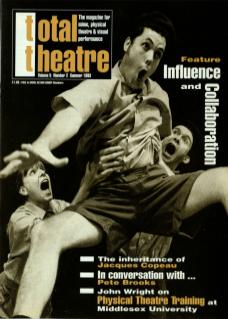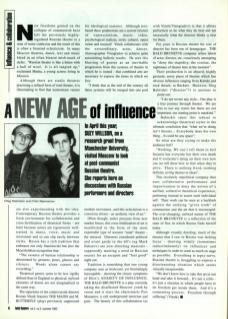New freedoms gained on the collapse of communism have left the previously highly regulated Russian theatre in a state of some confusion, and the result of this is often a frenzied eclecticism. In many Moscow theatres, dance, text and music blend in an often bizarre mish-mash of styles. ‘Russian theatre is like a kitten with a ball of wool. It is all tangled up,’ exclaimed Masha, a young actress living in Moscow.
Although there are studio theatres practising a refined form of total theatre, it is illuminating to find that mainstream venues are also experimenting with the idea. Contemporary Russian theatre provides a fresh environment for collaboration and cross-fertilisation of theatrical forms – not least because actors are rigorously well-trained in dance, voice, music and movement, and so can slip easily between styles. Russia has a rich tradition that embraces not only Stanislavski but also the Meyerholdian recognition that:
‘The essence of human relationship is determined by gestures, poses, glances and silences. Words alone cannot say everything.’
Theatrical genres seem to be less rigidly defined than in England so physical, stylised elements of drama are not marginalised in the same way.
The repertoire of the controversial director Roman Vituik features The Maids and M. Butterfly (plays previously suppressed for ideological reasons). Although text-based these productions are a surreal mixture of expressionism, music video, psychological realism, erotic cabaret, opera, mime and musical! Vituik collaborates with the extraordinary, actor, dancer, choreographer Vinogradov to achieve quite astonishing balletic results. He sees this blurring of genres as an inevitable progression from the systems of theatre in which he is rooted – that combined arts are necessary to express the times in which we live:
‘I think that at the end of the century all these systems will be merged into one post modern movement... and this eclecticism is a conscious choice – an aesthetic view of art.’
Often though, under pressure from new market forces, this cross-fertilisation of art is manifested in the form of the most exportable type of western ‘total’ theatre – the musical. Directors considered political and avant garde in the 60s (e.g. Mark Zakharov) are now directing musicals – supposedly meeting a need in Russian society for an escapist and ‘feel good’ night out.
Tradition is something that one young company sees as irrelevant, yet frustratingly inescapable – showing the classic symptoms of Eliot's Anxiety of Influence. The Bald Brunette is a play currently taking the disaffected Moscow youth by storm and it stars the charismatic Petr Mamanov, a cult underground musician and poet. The beauty of this collaboration (as with Vituik/Vinogradov) is that it allows performers to do what they do best and not necessarily what the director thinks is best for them.
For years in Russian theatre the role of director has been one of demagogue. The Bald Brunette company refuse labels of actor, director, etc, consciously attempting to ‘deny the stupidity, the routine, the nightmare of theatre here at the moment’.
Their production is an absurd, highly gestural, noisy piece of theatre which has obvious influences ranging from Kabuki and rock thrash, to Beckett. However, Oleg Babitskii (‘director’?) is anxious to point out:
‘I do not revere any style... Our play is a free journey through theatre. We are free to use any styles but these are not important, our starting point is mankind.’
Babitskii takes this refusal to acknowledge theatrical styles to the ultimate conclusion that: ‘what we're doing isn't theatre... Everybody does his own thing... It could be any space.’
So what are they trying to make the audience feel?
‘Nothing. We can't tell them to feel because everyone has their own death and if everyone's dying on their own how can we tell them how to feel when they're alive. There is nothing fixed, nothing definite, no big themes or ideas.’
This resolutely unpolitical company then uses collaborative performance and improvisation to deny the notion of a unified, collective theatrical experience, preferring instead to assert each individual self. Their work can be seen as a backlash against the unifying ‘given truth’ of communism and the art that it encouraged. The ever-changing, unfixed nature of The Bald Brunette is a reflection of the state of flux in which Russia finds herself today.
Although visually dazzling, much of the theatre that I saw in Russia was lacking focus – drawing widely (sometimes indiscriminately) on influences and techniques in order to cram as much on stage as possible. Everything is topsy-turvy. Russian theatre is struggling to express a disorientating situation which seems virtually inexpressible.
‘We don't know how to take this art in our hand and take it forward... It's not a crisis – it's just a situation in which people have to let freedom get inside them. And it's a tormenting process. Freedom through suffering.’ – Vituik

